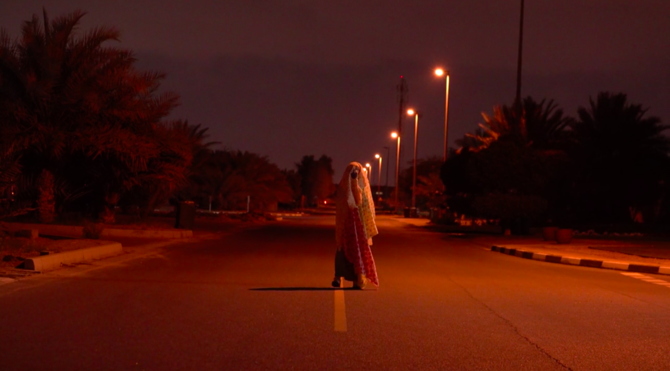SHARJAH: “Everyone in the Emirates has a jinn story — or a family with a jinn story, and yet everyone waivers in their belief. It’s not so much about the jinn as it is about what belief in spirituality allows us to do as humans.”
Emirati visual artist Farah Al-Qasimi is talking about her new film, a 40-minute fictional ‘documentary’ called “Um Al Naar” (Mother of Fire). The film will be shown for the first time in the region as part of Al-Qasimi’s solo show “Arrival,” which opens at the Third Line in Dubai on September 18 and runs until November 23.
The film’s titular protagonist is a jinn — a spirit capable of possessing humans — starring in a reality TV special in which she narrates her version of the history of her region (Ras Al Khaimah in the UAE).
“She laments her waning power and the loss of belief in the supernatural, and eventually decides to take matters into her own hands,” Al-Qasimi tells Arab News.
“We have come to known the jinn through folklore as mischievous, malignant characters, but I'm presenting Um Al Naar as an entity who might be simply misunderstood. Her dilemma is a fear of change, however inevitable and constant it is.”

Al-Qasimi is perhaps better-known for her photography than her films, but in this case, she says, “A longer film seemed appropriate; it gives room for different melodramas to unfold.
“I’m really interested in hearing people speak for themselves,” she continues. “The film moves between real documentary footage and silly, in-studio mockumentary, but everyone is speaking in their own expressive language, whether it's Um Al Naar, Ahmed the exorcist, or the men telling stories of jinn encounters.”
While there is a significant amount of humor in the piece, Um Al Naar “asks questions about belonging, mobility and cultural hegemony; questions that linger as we consider the significance of a lingering international presence in the Gulf, and questions of national progress and who (the Western presence serves),” Al-Qasimi explains.
“In our middle-school history books, the Portuguese and British invasions of the 1500s onwards is often overlooked or, at most, casually mentioned. And that's a pretty formidable history to contend with for such a young nation,” she continues. “The views are Um Al Naar's, but I like to think of her as an amalgamation of many of the critical thinkers I know and admire. She has a deep sense of love for her land, and considers critical thinking a necessary part of that love.”











